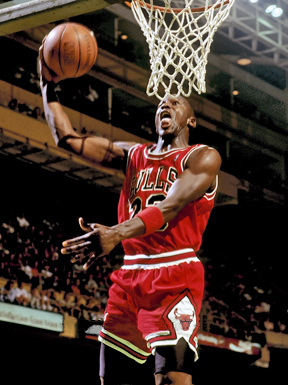ESPN’s “The Last Dance” highlights the dark side of Michael Jordan’s glory days

Steve Lipofsky
May 28, 2020
First released on Apr. 19, “The Last Dance” is a new documentary series based on Michael Jordan’s prime years in the NBA with the Chicago Bulls, more specifically the final championship season in 1997-98. The ten-part documentary contains never-seen-before footage, as well as in-depth interviews with over 100 people that were closely involved with the team.
While the documentary was originally planned to be released in June, the recent outbreak of the coronavirus has led ESPN to release the long-awaited documentary, 20 years in the making, early, as the nation is in quarantine. Over the course of five weeks, the two-hour episodes are shown every Sunday, allowing older basketball fans to reminisce on the glory days over the span of about a month, as the final episode was released on May 17. Just the first and second episode alone have garnered an average of 6.1 million viewers across ESPN and ESPN2.
One of the most intriguing aspects of the documentary is the way it is able to convey the raw emotions of Jordan, almost humanizing him when he is constantly put on a pedestal for his achievements. Jordan is seen in tears as he describes his obsession with winning and his rigorous leadership methods. There are even moments of Jordan crying to to the fatherly figures in his life late at night, in pain about his own father’s murder. The way in which the documentary portrays Jordan as struggling emotionally allows viewers to empathize with him and slowly understand the turmoil he was in while being considered the greatest basketball player of his time.
“Michael lived a different life than the rest of us out of necessity,” Steve Kerr, a former teammate, said about Jordan during the documentary. “It was very difficult to reach him emotionally.”
However, Jordan has been known for his constant need to be in a position of power, and his behavior was often viewed in a negative light during his time with the Bulls. The documentary highlights Jordan’s addiction to gambling, but also his fierce and passionate personality. The countless nights of wanting to be the very best is exemplified in the documentary, showing his impeccable work ethic. His addiction to the game is seen in his game-winning shot in 1998. Many believed that was the perfect place for him to end his career, only for him to come back and play for the Washington Wizards three years later for two seasons. He wanted to be on top for as long as he could, no matter the consequence.
As the documentary continues along, there is an enormous amount of guilt that Jordan appears to be feeling despite bidding farewell to the game many years ago. The greatness that Jordan brought to the Bulls ultimately became his greatest enemy, as owner Jerry Reinsdorf did not want to keep spending money to keep the Bulls together. However, he had no choice due to the fact that this team was run by individual players with mass amounts of power, adding to an already toxic culture that Jordan created by being held to such high standards.
It was this mentality of always wanting more and not being grateful for what they have that leaves Jordan feeling guilty — we will always remember Jordan and the Bulls, but what about after? He believes the team could have accomplished more had they not had this rivalry mentality within the team, greedy for more championships instead of appreciating the process. His behavior was one focus in the documentary that caused many to see another side to Jordan that they had not seen before: his bullying. The storyline centered around Jordan’s bullying of the other teammates because he felt the need to dominate them. But to Jordan, it all came down to the price of winning.
“I’m only doing it because it is who I am. That’s how I played the game. That was my mentality. If you don’t want to play that way, don’t play that way,” Jordan says before declaring “Break” and rising from his seat.
Despite the intriguing way in which the documentary was shot, insider clips layered with comprehensive interviews, critics are skeptical of how much of the documentary can actually be trusted due to the influence Jordan has as a contributor and subject of every episode. Jordan’s permission was needed for a large part of the documentary, implying that he had a say in what was allowed to be premiered and what was not. Former Bulls member Horace Grant claims that a lot of what Jordan claims are purely lies.
“I would say [it was] entertaining, but we know, who was there as teammates, that about 90% of it — I don’t know if I can say it on air, but B.S. in terms of the realness of it,” Grant said. “It’s his narrative of what happens in the last, quote-unquote, dance. That’s not a documentary, because a whole bunch of things were cut out, edited out. So that’s why I call it a so-called documentary.”
While it may not be considered the best journalism, the documentary has still managed to keep the nation on its feet in hopes of more thrilling and emotional segments of Jordan’s peak during the NBA, even becoming the highest-rated documentary project ever in sports network history.
“The exceptional content of the series has cut through culturally and sparked conversations far beyond ESPN platforms,” said Connor Schell, the network’s executive vice president for content.




